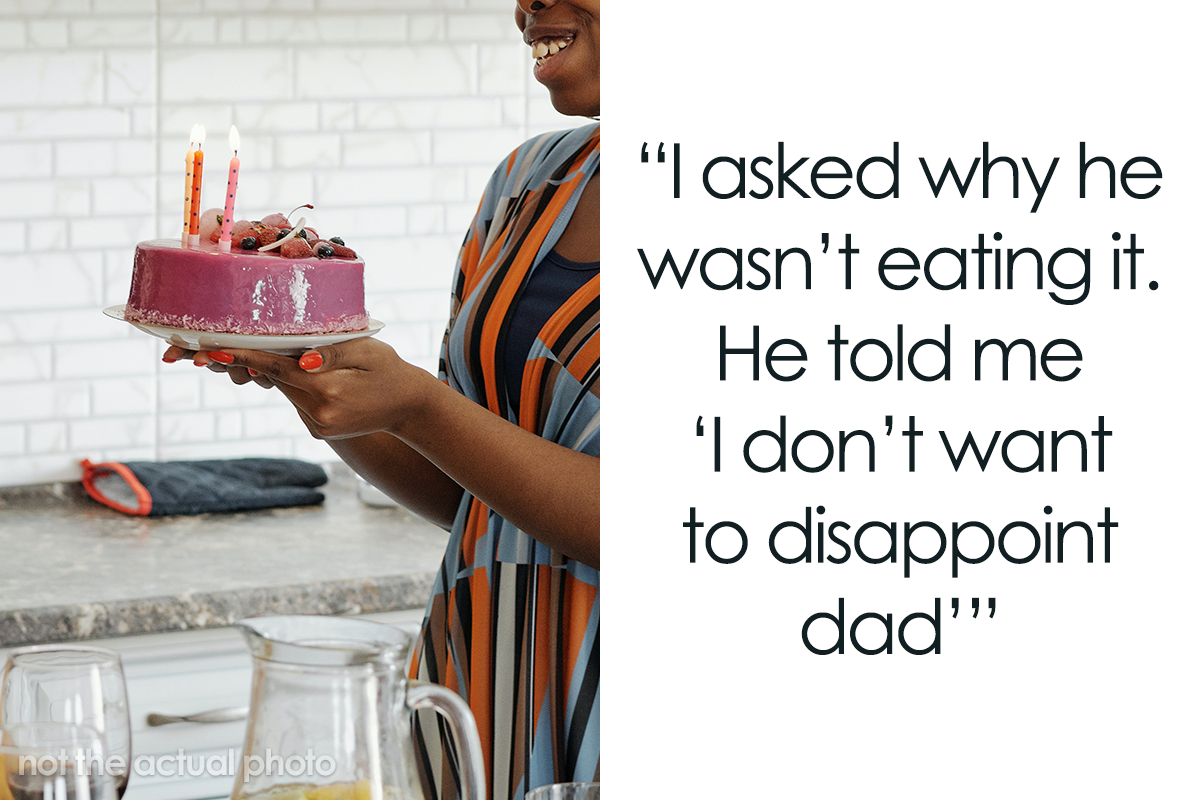
“I Don’t Want To Disappoint Dad”: Woman Finds Out Why Her Son Didn’t Eat Cake At His Birthday, Says It’s A Wake-Up Call
Happy birthday to you, happy birthday to you, happy birthday dear frieeeeend, happy birthday to you! Now blow out the candles, make a wish, and cut yourself a slice of that delicious cake!
The cake is arguably one of the best parts of celebrating a birthday. The cherry on top of spending your special day surrounded by loved ones is getting to enjoy your favorite sweet treat and sharing a slice of that deliciousness with all of your friends and family members. Everybody loves a great birthday cake, but especially for kids, it’s usually one of the highlights of the occasion.
So when one 11-year-old boy recently opted not to eat his birthday cake for fear of disappointing his father, his mom became extremely concerned. Below, you’ll find a story that was recently shared on the True Off My Chest subreddit by a mother who is worried about how her husband has affected her son’s relationship with food.
Keep reading to also find some of the responses from concerned readers, as well as an interview with Registered Dietician Kinga Balogh, of JM Nutrition, and then if you’re interested in reading another Bored Panda article discussing the difficult topic of eating disorders, we recommend reading this story next.
After her 11-year-old son deprived himself of birthday cake as to not disappoint his father, this mom became concerned that her husband’s habits were causing harm
Image source: August de Richelieu (not the actual photo)
Image source: August de Richelieu (not the actual photo)
Image source: millaca1
Everyone deserves to enjoy a slice of cake (or two!) on their birthday. In fact, everyone deserves to enjoy a slice of cake whenever they like. Sure, it might not be ideal to eat cake every single day, but when the mood strikes or you’re celebrating a special occasion, there is absolutely nothing wrong with enjoying some cake (or ice cream or pizza or whatever else you prefer). Demonizing certain foods or attaching guilt to them only causes harm and sucks all of the joy out of eating them in the first place, and especially with young and impressionable children, adults should be very mindful of how they talk about food.
To gain more insight on this topic we reached out to JM Nutrition‘s Registered Dietician, Kinga Balogh, who specializes in nutritional counseling for eating disorders and disordered eating. First, we asked Kinga if being scared to eat certain foods like this is a sign of a potential eating disorder. “Developing a hierarchy of what foods are safe, unsafe or outright distressing is a sign of disordered eating behaviors, particularly if surfacing in childhood,” she told Bored Panda. “Often, kids internalize messages they hear from grown-ups or peers around what constitute healthy food choices. The narrower the repertoire of safe foods becomes, the more this can be deemed as a red flag.”
“I often encounter families that hold very strong values around food and eating habits, with perfectionistic tendencies and rigid food rules that sadly do not translate to holistic health outcomes in the long run,” Kinga shared. “To help reduce family dynamics triggering disordered eating patterns in kids, I apply a family-based approach to possibly rewrite and reframe inadvertently harmful messaging around certain foods by normalizing all foods. The goal is to allow children to feel relaxed and be matter of fact around consuming all kinds of foods in the context of structured and consistent family meal and snack times.”
“Families often categorize high-fat, high-sugar, and relatively low-nutrient foods, such as sweets, chips and sodas ‘forbidden’ and often limit children’s access to these choices. Studies, however, show that children whose ‘forbidden’ food intake is restricted, often eat more of them when they get a chance and tend to gain more weight during adolescence as a result,” Kinga explained. “Therefore, aiming for nourishing our family through balance and variety, where all foods fit, proves to be a more helpful approach.”
We were also curious if it’s common for children this young, only 11-years-old, to develop disordered eating habits. “Disordered eating symptoms can manifest at a surprisingly young age,” Kinga noted. “Children as young as 5 years of age can be diagnosed with ARFID (Avoidant/Restrictive Food Intake Disorder). This condition is characterized by extreme pickiness in choosing foods, anxiety when presented with ‘feared foods’, failure to gain weight based on growth charts, lack of appetite, and disturbed feeding patterns (such as difficulty chewing foods, frequent vomiting or gagging when exposed to certain foods). Unlike other eating disorders such as with anorexia or bulimia, kids with ARFID do not have a distorted body image or body image dissatisfaction.”
Kinga also shared that feeding challenges are often associated with other conditions, such as autism spectrum disorder (ASD), attention-deficit/
“Anorexia diagnosis usually peaks at 13-14 years and again at 18 years for boys. Being scared of eating certain foods is a sign of having rigidity and restrictive tendencies suggesting a desire to control body weight/shape/size characteristic of anorexia. A comprehensive medical, psychological and nutritional evaluation is necessary to arrive to a diagnosis; isolated symptoms are insufficient to give a definitive answer,” Kinga told Bored Panda.
“Making decisions about food is the first independent skill we give our youngsters- breast or formula-fed infants begin to self-regulate how much they are going to take in,” she continued. “Toddlers, with the explosion of their language skills will ideally include a gradually broadening variety of foods to satisfy their senses, nourish their bodies and grow optimally as observed on growth charts by health care professionals. Feeding challenges, such as lack of appetite, picky eating and consequently failure to gain weight in an age-appropriate pattern should alert caregivers to seek the attention of a medical and/or nutritional professional for guidance.”
We also asked Kinga if parents’ eating habits always have an impact on their children’s eating habits. “One cannot say that family eating habits will be fully adopted by the youngsters, however, we know from human behavioral sciences, that little ones learn behaviors by mimicking that of their parents,” she told Bored Panda. “Furthermore, kids internalize a lot of the messaging around food as well. If, for example, a family member is on a diet, restricts certain foods, and eats differently at mealtimes than the rest of the family, kids pick up on those scenarios quickly. As kids grown, particularly by their teenage years, peer interactions and social media exposure begin to outweigh family influences. Yet, the seed to eating habits is often planted in early childhood.”
“Having a weight- and appearance-centric upbringing certainly alerts kids to focus their attention on diet, exercise, and appearances in a more accentuated way,” Kinga added. “This can then predispose disordered eating, body dissatisfaction and poor self-esteem to name a few adverse effects.”
And when it comes to helping children in a similar situation mend their relationship with food, Kinga says, “Coming from a place of compassion and empathy is very important as parents engage their kids in an open dialogue about the possible signs of an eating disorder. Affected individuals often have a combination of fear, anxiety, shame and flawed beliefs about food and their bodies that make dialogue on the topic very challenging. Asking open-ended questions is an excellent first step. Asking, ‘How would you describe what you’re going through?’ is a good first step. Explicitly stating observations about changing eating habits is also instrumental. Parents can state the following: ‘I’ve noticed you seem to avoid certain foods lately. I am concerned that you may not get an adequate amount of nutrition.'”
Kinga also shared the following steps that parents can use to help their children: easing off on food rules at home- normalizing all foods, with emphasis on nutritious options for most meals; limiting comments on appearances- emphasize personal attributes more often; modeling body acceptance and intuitive eating patterns (eating when hungry, stopping when full); rewarding behavior and achievement with non-food options, such as playing board games, going on an adventure, learning a new skill etc.; demonstrating dedication to meal preparation and enjoyment of family meals in a peaceful atmosphere, limiting children’s exposure to dieting behaviors at home – as this is a huge trigger for the onset of eating disorders in children; striving to ensure regular family meals.
“When parents witness persistent and worsening eating habits, coupled with changes in mood, socializing habits and academic or athletic performance, it is imperative to seek professional help,” Kinga told Bored Panda. “Getting an early diagnosis, being connected with the optimal care providers specializing in eating disorders and promptly stepping on the road to recovery, guarantees quicker recovery and minimizes suffering of the child and the family unit. Also, getting timely treatment can reduce the risk of health complications, such as worsening mental health status, heart disease, digestive ailments, memory issues, anemia and lowered immunity, just to name a few.”
While we cannot diagnose this father or his son with any eating disorders with the little information we know, there is no question that the risks of developing one are present. And recovering from an eating disorder is a long and arduous process that no one would wish on their loved ones, especially their children. It’s best to nip any disordered eating habits in the bud to save this child a possible lifetime of struggles. I hope that his mom intervenes now, and by his twelfth birthday, he’s eating a slice of cake without a second thought. We would love to hear your thoughts on this situation in the comments below, pandas, and if you’re interested in reading another article discussing the dangers of eating disorders, look no further than right here.
Readers echoed the mom’s concerns, expressing that it might be wise to consult an eating disorder specialist before this behavior escalates
This goes deeper than "just" the food or fitness issue. Kids are their own people, not a parent's "mini-me". They both need help here, that sounds really toxic.
Agree, this thoroughly disturbing post about food sounds like just the tip of an iceberg.
Load More Replies...I know everyone's mentioning the food (because it's the point of the story) but the whole "mini-me" thing is what breaks my heart more. What happens if the son decides to like comics that father doesn't. Or music (because musical trends change - is the kid going to be stuck liking early 2000's pop because that's what dad grew up liking *exclusively*?). What happens if the son discovers they are *gasp* not the same heterotypical alignment as their father? What happens when the son TURNS OUT TO HAVE A COMPLETELY DIFFERENT AND SEPARATE PERSONALITY OF THEIR OWN
To back this up... Please don't live vicariously through your children..... they're people for love's sake
Load More Replies...The stupid thing about these types of parents is they think they're controlling the child. Guess what? My family told me I was fat when I wasn't, bullied me about food all the time. I have a serious binge eating disorder now and am morbidly obese. I realized they only seemed to like me more when I was "thin" (I lost weight several times along the way), and that only makes it worse.
I have family who only treat you as human if you're thin. As soon as you put on weight it's like you're the scum of the earth. And like you I have B.E.D aswell. Putting people down about how fat or skin they are just leads to self loathing and E.D's. I hope you're doing better and don't have to deal with that toxicity as much now. Weight doesn't define you. We are all perfect in our own way. What one person finds imperfect another finds perfect.
Load More Replies...This goes deeper than "just" the food or fitness issue. Kids are their own people, not a parent's "mini-me". They both need help here, that sounds really toxic.
Agree, this thoroughly disturbing post about food sounds like just the tip of an iceberg.
Load More Replies...I know everyone's mentioning the food (because it's the point of the story) but the whole "mini-me" thing is what breaks my heart more. What happens if the son decides to like comics that father doesn't. Or music (because musical trends change - is the kid going to be stuck liking early 2000's pop because that's what dad grew up liking *exclusively*?). What happens if the son discovers they are *gasp* not the same heterotypical alignment as their father? What happens when the son TURNS OUT TO HAVE A COMPLETELY DIFFERENT AND SEPARATE PERSONALITY OF THEIR OWN
To back this up... Please don't live vicariously through your children..... they're people for love's sake
Load More Replies...The stupid thing about these types of parents is they think they're controlling the child. Guess what? My family told me I was fat when I wasn't, bullied me about food all the time. I have a serious binge eating disorder now and am morbidly obese. I realized they only seemed to like me more when I was "thin" (I lost weight several times along the way), and that only makes it worse.
I have family who only treat you as human if you're thin. As soon as you put on weight it's like you're the scum of the earth. And like you I have B.E.D aswell. Putting people down about how fat or skin they are just leads to self loathing and E.D's. I hope you're doing better and don't have to deal with that toxicity as much now. Weight doesn't define you. We are all perfect in our own way. What one person finds imperfect another finds perfect.
Load More Replies...
 Dark Mode
Dark Mode 

 No fees, cancel anytime
No fees, cancel anytime 




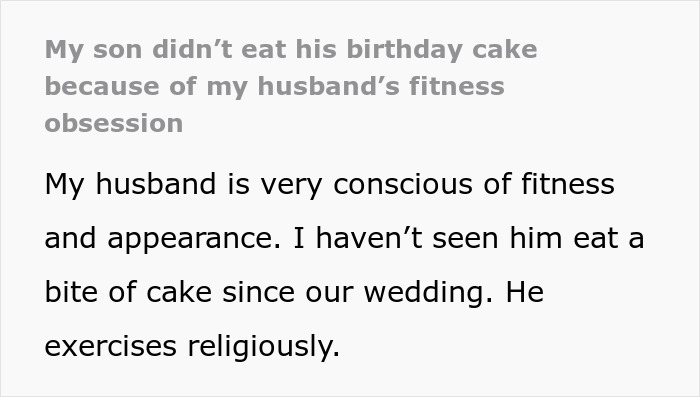
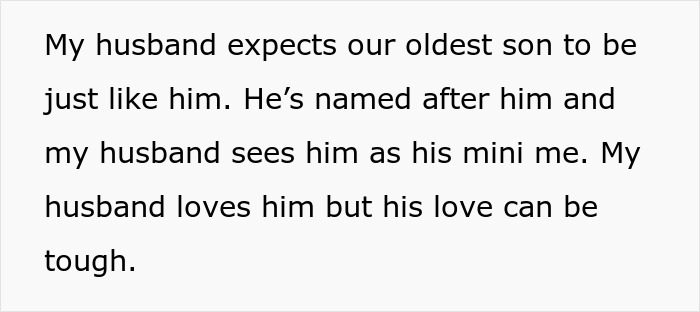

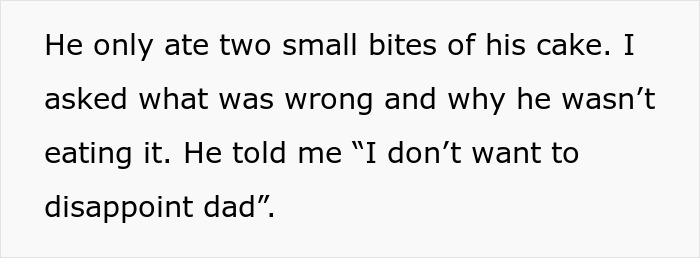

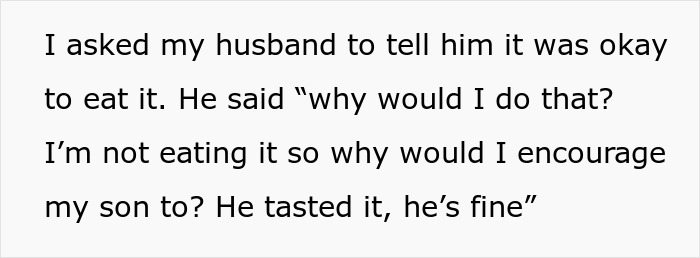

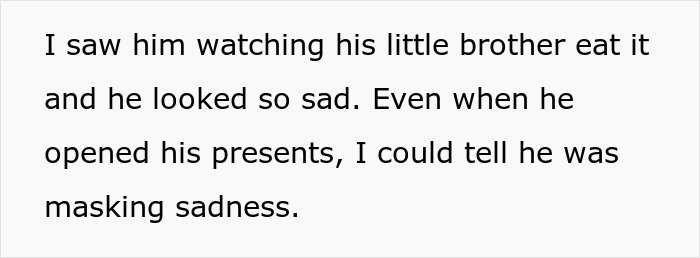


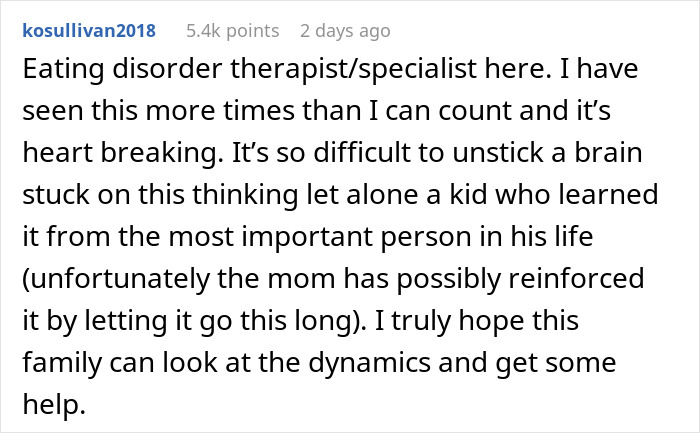
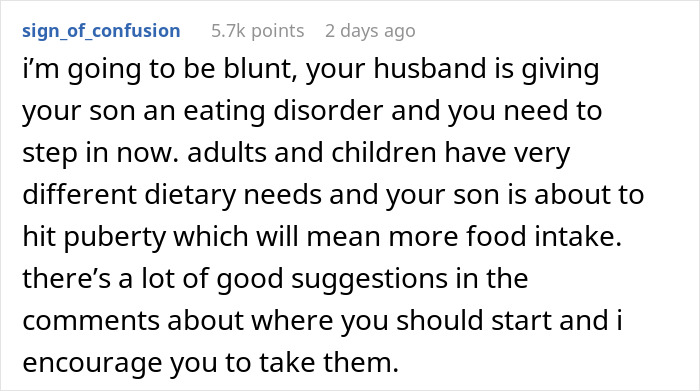
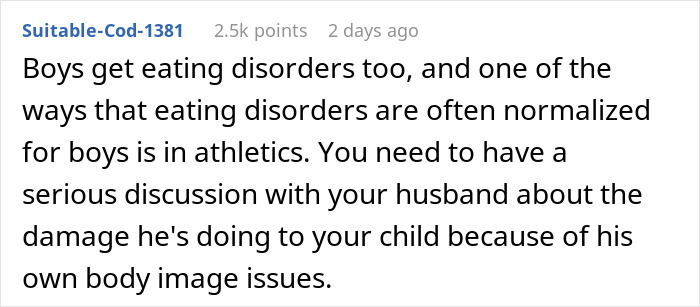
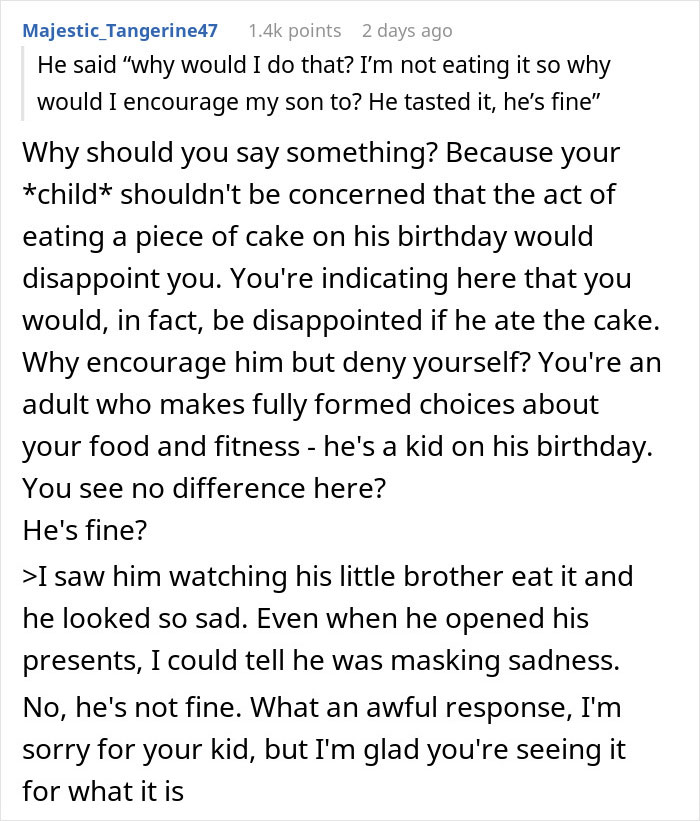
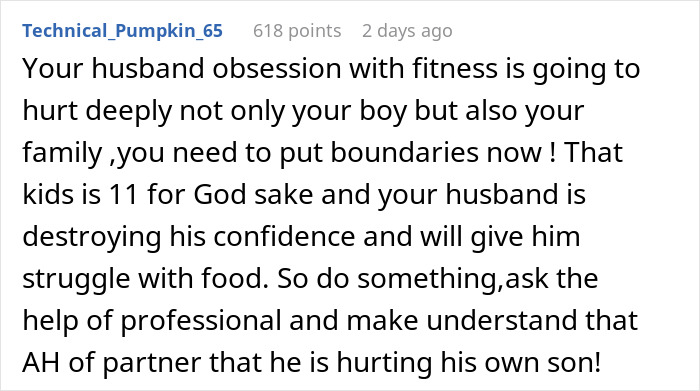
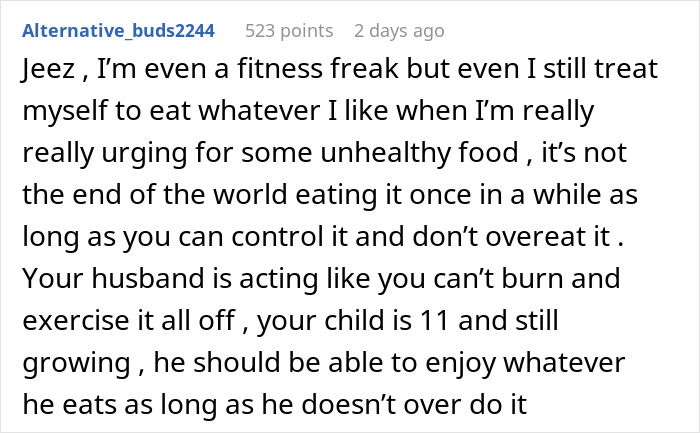
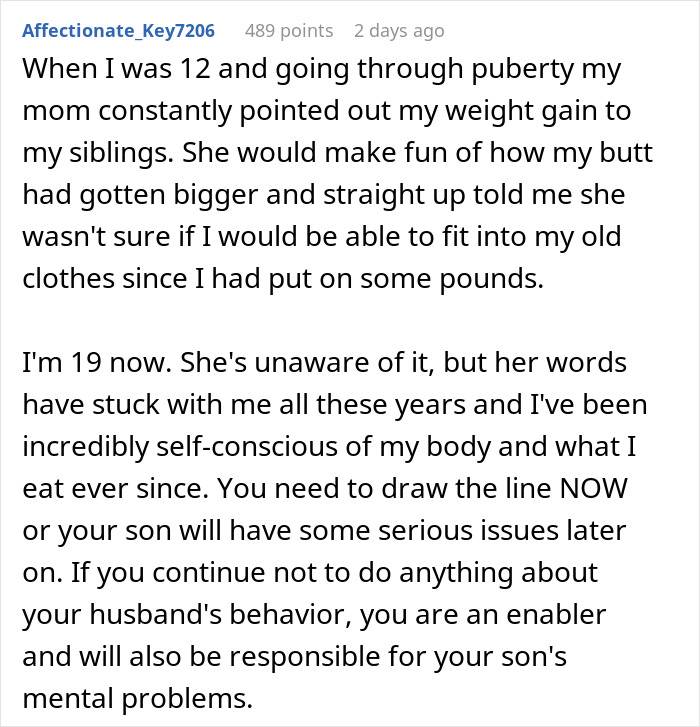
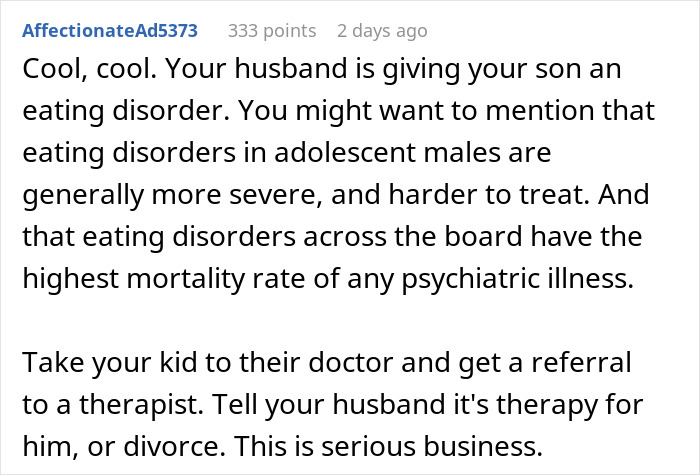

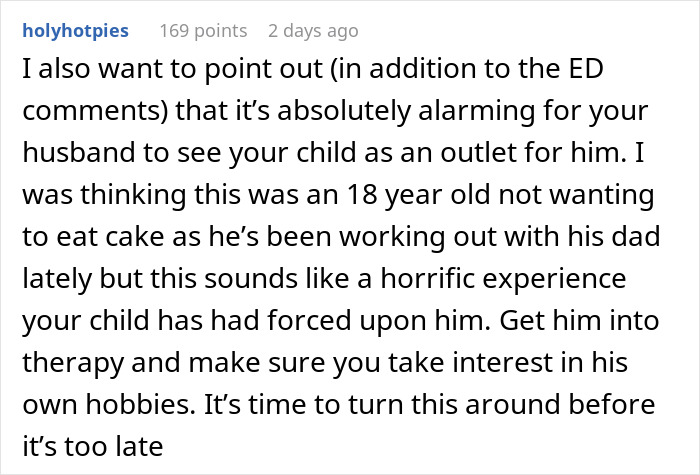

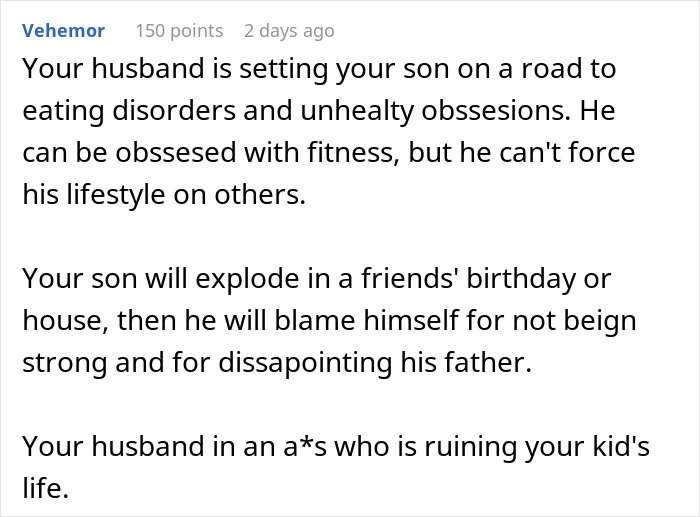





























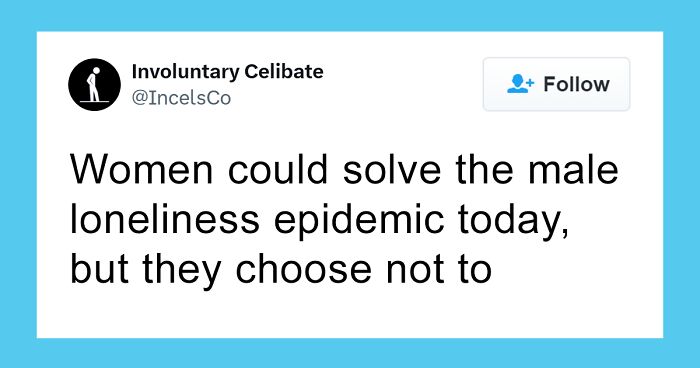
















112
78